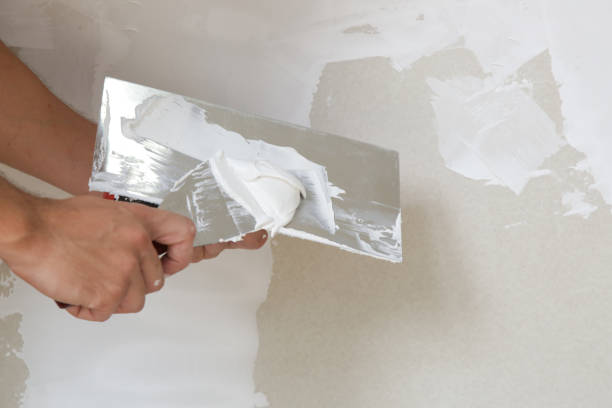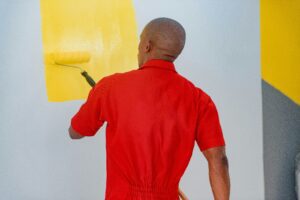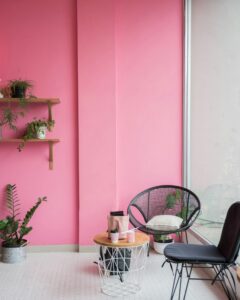What is Wall Putty?
Before answering the first and foremost question, what is wall putty; you should understand the reason that led to the prominence of this material. The increased demand for flawless wall finishes made this material the most suitable fit for the construction industry. It benefits both the end-user and field technicians. Moreover, its structural integrity makes it a suitable construction material for drywalls. Moreover, myriad uses of wall putty provide it an edge over the traditional construction paradigm. Its benefits overshadow the problems with wall putty, making it a sensible choice for builders and contractors.
Wall putty is a heterogeneous mixture of cement, gypsum, and polymers, providing this joint compound with a paste-like consistency. Its application allows construction professionals to create smooth textures before painting. However, its application extends beyond aesthetics and elegance.
Different types of wall putty have a widespread application in the construction industry. The following are different wall putty variants with high-end applications:-
- Acrylic Wall Putty: Acrylic wall putty is a water-based solvent that is ready for application and does not require additional water action.
- Cement-Based Wall Putty: It is most suitable for stuffing in gaps, cracks, or breaks.
Among the above, which wall putty is best? It is a question that has an answer subjective to the specific requirements of a unique structure. Construction professionals may take the initiative to use either based on variables like climate, locality, budget, etc. However, waterproof wall putty will be the best for structures in humid areas. The waterproofing will keep the structural integrity intact and will protect the end user from general discomfort due to water ingress.
For More Information: Essential Guide To Wall Putty: From Powder To Perfect Finish
The Advantages of Wall Putty for High-Endurance Walls
The following are the advantages of wall putty that make it the best material for creating high-endurance walls:-
- Cost-Effective: Compared to traditional methods like concrete or brick walls, wall putty offers a significant cost advantage. The material itself is relatively inexpensive, and the application process requires less labor and expertise.
- Versatility: Wall putty can be applied to various wall substrates, including brick, concrete, plaster, and drywall. This flexibility makes it a suitable option for a wide range of construction projects.
- Crack Prevention: By filling in minor cracks and unevenness, wall putty creates a smooth and seamless surface. This reduces stress points and minimizes the risk of future cracks developing.
- Improved Fire Resistance: Certain types of wall putty are formulated with fire-retardant properties. These can enhance the wall’s resistance to fire damage, providing an additional layer of safety.
- Moisture Resistance: Specific wall putty formulations offer improved moisture resistance, making them suitable for areas prone to humidity or dampness. This can help prevent mold and mildew growth, extending the lifespan of the wall.
- Aesthetic Appeal: Wall putty creates a smooth and flawless surface, providing a perfect canvas for paint or other decorative finishes. This enhances the overall visual appeal of the space.
- Ease of Application: Applying wall putty is a relatively simple process, especially compared to more complex wall construction methods. This can save time and labor costs during construction.
Detailed guide: Troubleshooting Common Wall Putty Problems
Understanding the Limitations of Wall Putty
Understanding the limited efficacy of a material is unequivocally important. It benefits both end-users and structural craftsmen from taking the wrong call. While wall putty offers an array of benefits for high-endurance walls, it’s crucial to understand its limitations:-
- Load-Bearing Capacity: Wall putty is not designed to be a load-bearing structure. It cannot replace structural elements like beams or columns that support the weight of the building.
- Extreme Weather Conditions: While some formulations offer improved weather resistance, wall putty might not be suitable for exterior walls exposed to harsh weather conditions.
- Structural Repairs: Wall putty cannot repair major structural cracks or damage. For extensive repairs, a professional assessment and appropriate solutions are necessary.
How to Maximize the Benefits of Wall Putty?
To ensure wall putty effectively contributes to high-endurance walls, consider these factors:-
- Substrate Selection: Choose a wall substrate compatible with the selected wall putty type. For example, a polymer-based putty might be more suitable for concrete walls compared to a gypsum-based one.
- Surface Preparation: Proper preparation of the wall surface is essential. This includes cleaning, removing loose paint or debris, and filling any major cracks with a suitable patching compound before applying the wall putty.
- Application Technique: Follow the manufacturer’s instructions for proper mixing and application of the wall putty. Ensure even application and adequate drying time between coats.
- Multiple Coats: For optimal results, consider applying multiple thin coats of wall putty instead of one thick layer. This allows for a more even and stable finish.
- Professional Consultation: For complex projects or when dealing with structural concerns, consulting a building professional can ensure the appropriate selection and application of wall putty for your specific needs.
Also Know: Top Benefits of Using Premium Quality Wall Putty in Construction
The Future of Wall Putty in Building Practices
The advancements in wall putty technology are continually expanding its applications. With the development of new formulations offering improved strength, flexibility, and weather resistance, wall putty has the potential to play an even more significant role in cost-effective and sustainable construction practices.
The potential of wall putty extends far beyond its current applications in creating high-endurance walls. As research and development continue, we can expect to see exciting advancements in wall putty technology, transforming its role in the construction industry. Here’s a glimpse into what the future might hold:-
- Eco-Friendly Formulations: A growing emphasis on sustainability in construction will likely lead to the development of wall putty formulations with lower environmental impact. This could involve using recycled materials, reducing reliance on harmful chemicals, and exploring bio-based alternatives.
- Energy Efficiency: Wall putty with enhanced thermal insulation properties is a potential future development. This could involve incorporating materials that create a barrier against heat transfer, contributing to energy-efficient buildings.
- Reduced Waste: Advancements in application techniques and pre-mixed formulations could minimize on-site waste generation during wall putty application. This aligns with the growing focus on minimizing construction waste and promoting sustainable practices.
- Smart Wall Putty: Imagine wall putty with embedded sensors that can monitor temperature, humidity, or even structural integrity. This could provide real-time data on wall health, allowing for early detection of potential problems and preventive maintenance.
- Self-Healing Properties: Research is underway on self-healing materials, and wall putty might not be far behind. Imagine walls that can automatically repair minor cracks or damage, extending their lifespan and reducing maintenance costs.
- 3D Printing Applications: The integration of 3D printing technology with wall putty could revolutionize construction practices. This could allow for the creation of customized wall structures with complex designs or improved functionalities.
- Self-Cleaning Surfaces: Wall putty formulations with self-cleaning properties could become a reality. This would be particularly beneficial in high-traffic areas or spaces prone to dust and dirt accumulation.
- Air Purification: Wall putty infused with air-purifying properties could actively improve indoor air quality by absorbing pollutants or even reducing allergens.
- Customizable Finishes: Advancements could allow for wall putty with integrated decorative finishes, eliminating the need for separate paint or wallpaper applications. Imagine walls that come pre-finished with a variety of textures or patterns.
Also Know: How Waterproof Wall Putty Can be Game Changer for Your Home
The Future is Collaborative
The future of wall putty is likely to be shaped through collaboration between material scientists, construction professionals, and architects. By working together, they can develop innovative solutions that address current challenges in the construction industry and create a more sustainable, efficient, and functional future for walls.
Concluding Remarks
In conclusion, wall putty emerges from the shadows as a champion of affordability and durability in wall construction. Its ease of use, versatility, and ability to enhance the strength and aesthetics of walls make it an attractive option for projects of all scales. While understanding its limitations is crucial, proper application and material selection unlock its true potential. As research and development continue, the future of wall putty promises exciting possibilities. From sustainable formulations to self-healing properties and integrated functionalities, wall putty is poised to become a game-changer in the construction industry. So, the next time you embark on a building project, consider the hidden potential of wall putty, a cost-effective solution for building walls that are not only strong and beautiful but also contribute to a sustainable future. However, bearing its limitations in mind will keep you protected from further issues in the construction.
Thank you for choosing Star Wallcare Putty—where your walls meet our expertise!



